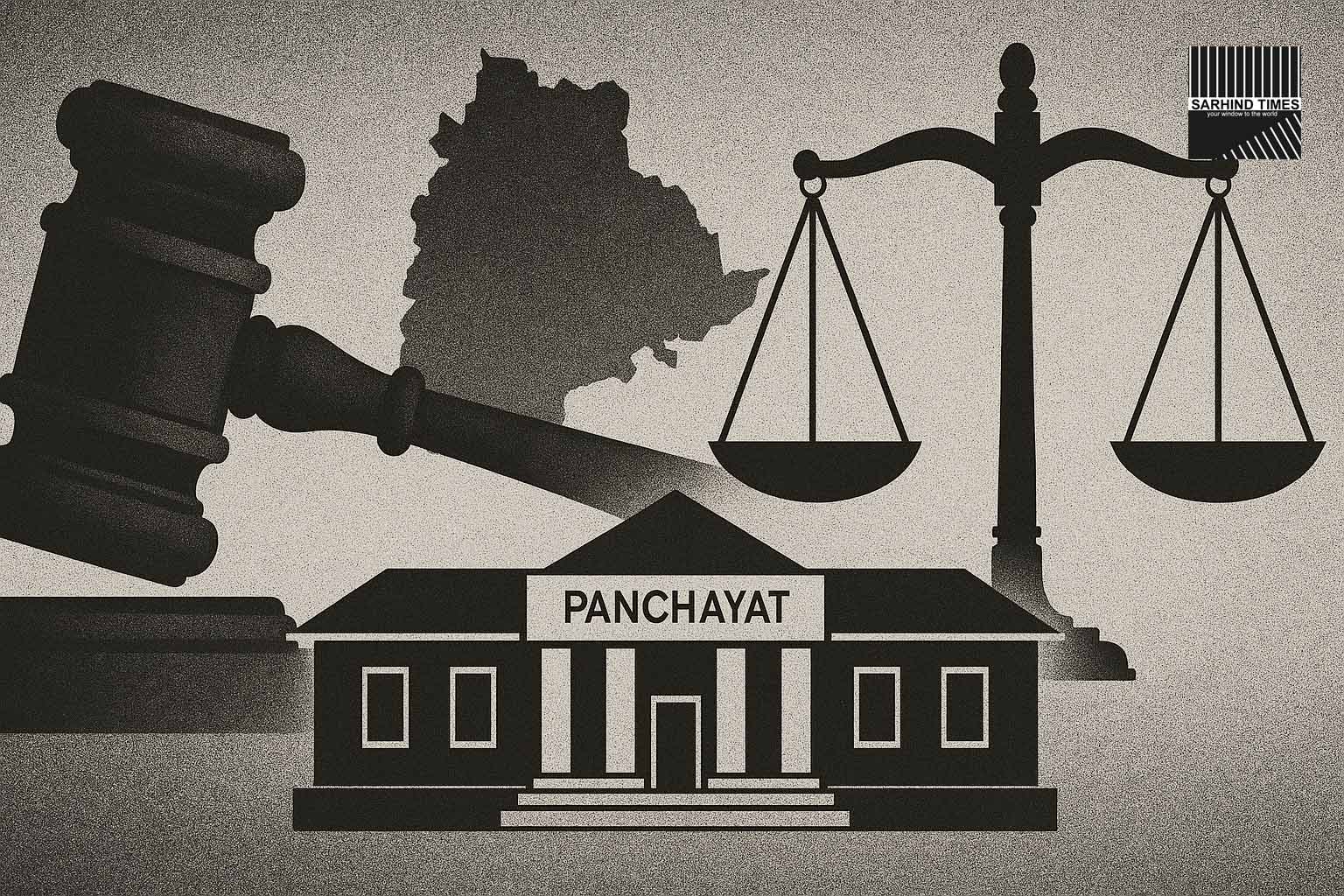Bench reaffirms 50% ceiling; Telangana must meet rigorous evidentiary tests before raising reservations
Hyderabad / New Delhi, October 17, 2025 — The Supreme Court on Thursday declined to lift the Telangana High Court’s interim stay on the state government’s plan to enhance OBC (Other Backward Classes) reservations in local bodies, effectively putting the proposed hike on hold until further review. The apex court cited binding precedents that total reservation in local body elections must ordinarily not exceed 50%, and that any deviation must be justified by robust data and adherence to the “triple test” framework.
This verdict represents a sharp judicial pushback on Telangana’s move to raise OBC quota from about 25 percent to 42 percent — which, along with existing SC/ST quotas, would have resulted in an aggregate reservation of 67 percent in municipal, panchayat and rural local bodies. The decision now forces the state government to present fuller empirical evidence, tighten its legal footing, and rethink implementation timing in the run-up to local elections.
Below, we examine the background, legal contours, political stakes, strategic options for Telangana, and the broader implications for reservation jurisprudence in India.
I. Background & What Led Up to the Dispute
Telangana’s Proposed Quota Increase
In September 2025, the Telangana state government issued GO 9 (and related GOs) to increase OBC reservation in rural and urban local bodies from ~ 25 percent to 42 percent. This was part of a legislative push (via a Backward Classes Bill passed unanimously in the Telangana Assembly) to expand political representation for backward communities.
The state claimed that its recent SEEEPC (Socio-Economic, Educational, Employment, Political and Caste) Survey showed that backward castes constitute roughly 56.33% of the state’s population, warranting a higher quota. These findings were forwarded to a one-man commission (retired IAS officer Busani Venkateshwara Rao), which recommended the 42 percent figure.
However, critics challenged both the methodology and the legal validity of applying such a hike to local bodies, arguing that the move would breach the constitutionally acceptable reservation ceiling and lacked detailed seat-wise calibration.
High Court Stay & Interim Order
On October 9, the Telangana High Court issued an interim stay on GO 9 and related guidelines, instructing that elections to local bodies must proceed under the preexisting reservation levels. The court held that prima facie, the proposed hike appeared to transgress the 50 percent ceiling doctrine, and that Telangana’s process did not fully adhere to the Supreme Court’s established triple test.
The High Court also directed the State Election Commission to treat the additional reserved seats (in effect temporarily unrecognized quota) as open category seats, to avoid delaying elections.
Supreme Court Plea & Demands
Unwilling to accept the stay, Telangana filed a Special Leave Petition (SLP) in the Supreme Court, seeking vacatur of the High Court’s order. The state, through senior counsel Abhishek Manu Singhvi, argued that the 50 percent limit is not absolute and can be exceeded under exceptional circumstances if supported by data. He also invoked the concept of “deemed assent” in the context of the governor delaying assent to the Bill, as per recent judicial interpretations.
Nonetheless, on October 16, a bench led by Justices Vikram Nath and Sandeep Mehta refused to interfere with the High Court stay. The bench observed that it could not adopt a position contradictory to past constitution bench rulings on the 50% cap, and dismissed the petition, while clarifying that the High Court remains free to adjudicate the substantive case on merits.
Crucially, the Supreme Court allowed the elections to go ahead under the existing reservation regime (i.e., without the proposed hike) and stressed that the dismissal of the plea should not prejudice the High Court’s final adjudication.
II. Legal & Constitutional Principles at Play
The 50% Reservation Ceiling Doctrine
The Supreme Court’s doctrine that reservations in public employment and local bodies should generally not exceed 50 percent enjoys deep roots in Indian jurisprudence, particularly following the Indra Sawhney (Mandal) judgment (1992). That ceiling ensures a balance between affirmative action and equal opportunity in competitive domains.
Moreover, in relation to local bodies, the Supreme Court in the K. Krishna Murthy (2010) judgment reaffirmed that even in local government reservations for backward classes, exceeding 50% could only be allowed in exceptional circumstances, backed by data, and under strict conditions.
The Triple Test / Triple Conditions
To justify reservation, especially when expansion is proposed, courts require states to satisfy certain conditions (often called the triple test):
- Empirical data and credible commission: The state must set up a commission to scrutinize backwardness, demographic proportions, and relevant indicators.
- Appropriate proportionate allocation: Quotas must be reasonably calibrated — seat-wise distribution, local nuances, and not a blanket expansion.
- Administrative efficiency and impact: The expansion should not disproportionately impair the functioning of governance or violate fairness among groups.
Telangana’s critics contend that the state’s process fell short on calibration and transparency in applying these tests. The High Court’s stay emphasized that the GOs did not fully reflect seat-wise mapping or detailed justification.
Timing, Legislative Process & Governor’s Assent
One point of contention was timing: the court asked why Telangana did not issue the GOs before notifying elections, rather than contemporaneously. The bench questioned the logic of issuing a reservation hike while the election process was underway.
Another critical issue is the status of the Bill passed in the State Assembly: it remains pending presidential assent. Telangana’s counsel argued that under judicial interpretation, “deemed assent” may apply if the Governor/President fails to act in time. The bench probed whether such logic is tenable in reservation context.
Binding Nature of Constitution Bench Rulings
The Supreme Court in its refusal stated that it could not adopt a view inconsistent with the binding rulings of the constitution bench, including those fixing the 50% cap. This judicial deference to precedent constrains flexibility for states to challenge entrenched positions.
III. Political Stakes & Reactions
Telangana Government’s Position & Dilemma
The Congress-led Telangana government had promised a 42% OBC quota as part of its public mandate. The refusal by the courts undermines one of its flagship promises, triggering political backlash and community discontent.
Now, the state faces a choice: either persist in litigation, attempt supplementary data-based justification, or roll back ambitions and proceed under status quo quotas with political fallout. State officials reportedly are exploring legal routes and political maneuvers post the SC decision.
Opposition & Social Activist Responses
Critics and opposition parties (BRS, BJP) expectantly pounced. BRS leader K. T. Rama Rao (KTR) accused the Congress government of betraying BC communities, warning that the legal strategy was flawed and politically driven.
Petitioners opposing the GO maintain that the courts acted correctly, that mere population data cannot trump constitutional fairness, and that reservation cannot become unbridled.
Backward Communities & Public Sentiment
The BC community in Telangana, anticipating higher political representation, may feel disappointed and politically aggrieved. The government will need to manage expectations, narrative, and possible protests or mobilization.
At the same time, social justice advocates will closely monitor how the state responds, whether it supplements its data, makes incremental proposals, or opens dialogue.
IV. What the State Can (and Must) Do Next
Given the court’s insistence on rigorous justification, Telangana has several avenues to consider:
- Supplement data & seat-wise mapping
- Submit more granular empirical data — block/district-level backwardness metrics, occupation, education, social indices.
- Carry out a robust seat calibration showing how many seats justify reservation versus open competition.
- Refine the proposal to reduce breach stress
- Propose a more modest increase (e.g. from 25% → 30–32%) rather than a jump to 42%, mitigating the overall breach margin.
- Apply higher quotas in phases rather than in one sweep.
- Proceed with elections under existing quotas
- Given the courts allowed the elections to proceed, the state must ensure continuity — elections must not be indefinitely stalled.
- Engage politically and socially
- Dialogue with BC organizations, stakeholders, press narratives to manage discontent.
- Explore legislative adjustments, consensus building, or political accommodation.
- Legal appeal & arguments
- In its final case before the High Court (and possibly Supreme Court appeal), Telangana must build a compelling legal narrative — justifying exceptional breach, comparing with precedent, emphasizing population ratio, and engaging with landmark cases more fully.
- Consider constitutional or remedial route
- In the long run, if multiple states push similar claims, Parliament might explore constitutional reforms, though amending reservation rules is politically fraught.
V. Broader Implications for Reservation Jurisprudence
Reinforcing Judicial Gatekeeping
The decision reiterates that courts will rigorously gatekeep reservation expansions — merely legislative resolution or political will is insufficient. Empirical basis, proportional mapping, and fairness remain indispensable.
Limits to State Discretion
States cannot unilaterally override constitutional jurisprudence. Even in local bodies — often considered flexible domains — reservations must respect core constitutional limits.
Precedent for Other States
Other states eyeing to increase quotas (beyond current levels) will be cautious. This ruling strengthens the jurisprudential bar for similar attempts elsewhere.
Intersection of Democracy & Social Justice
The tension between electoral promises to marginalized groups and judicial constraints underscores the delicate balance. Democratic mandates must still conform to constitutional guardrails.
Evolution of Data-Driven Policy
This case emphasizes the growing centrality of rigorous data, commission reports, and evidence-led policymaking in sensitive domains of affirmative action.
VI. Key Takeaways & Outlook
- The Supreme Court’s decision is a significant setback for Telangana’s 42% OBC quota plan — the state must rebuild the basis meticulously before reattempting.
- The 50% reservation ceiling remains a powerful constitutional constraint; deviations must be rare and well justified.
- Telangana must proceed with local elections under existing quotas to avoid institutional delay, while honing legal and policy strategy.
- Political fallout within BC communities is likely — narrative management and stakeholder engagement will be critical.
- For India broadly, the verdict reinforces that social justice goals must rest on empirical legitimacy, not merely political will.
As legal hearings resume (likely in December before the High Court), all eyes will be on whether Telangana can present a water-tight empirical and legal case — and whether the High Court or Supreme Court will sanction exceptions in the name of inclusivity.
#SupremeCourt #Telangana #OBCReservation #Law #AffirmativeAction #ReservationCeiling #SocialJustice #LocalBodies #JudicialReview




+ There are no comments
Add yours